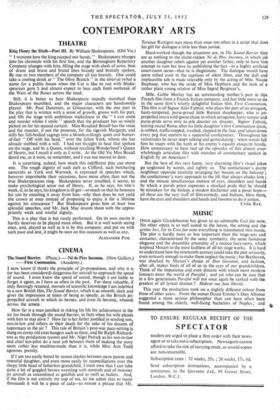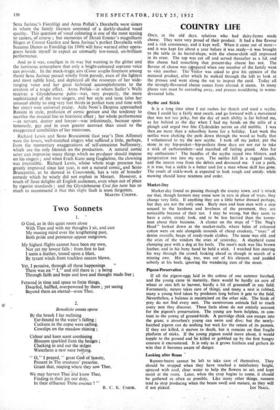MUSIC
ONCE again Glyndebourne has given us an admirable Cosi fan tutte. No other opera is so well suited to the house, the setting and the genius loci, for in Cosi fan tutte everything is transmuted into music. The plot is hardly more or less important than the stage-sets and costumes, characterised by the same symmetry, the same fastidious elegance and the dreamlike amorality of, a rococo fairy-story, which inspired Mozart to the most faultless of all his stage works. It is hard to understand how the nineteenth century could take the plot seriously, even seriously enough to make them neglect the music ; but Beethoven, was shocked by Mozart's choice of Don Giovanni, and fashion, after all, makes fools of all of us in the eyes of our grandchildren. Think of the impatience and eveh distaste with which most modern listeners enter the world of Parsifal ; and yet who can be sure that in a few generations Parsifal will not once again be ranked with the greatest of all lyrical dramas ? Habent sua fata libretti.
This year the production took on a slightly different colour from those of other years. From the outset Deszo Ernster's Don Alfonso suggested a more serious philosopher than can have often been found among the elderly, well-living bachelors of Naples ; and
'Sena Jurinac's Fiordiligi and Anna Pollak's Dorabella were- sisters in whom the family likeness consisted of a darkly-shaded vocal quality.. This question of vocal colouring is one of the most teasing to casters, of course ; but memories of Deszo Ernster's magnificent Hagen at Covent Garden and Sena Jurinac's perfect Dorabella with Suzanne Danco as Fiordiligi (in 1949) will have warned other opera- goers beside myself to expect an unusually low-toned, un-brilliant performance.
And so it was, excellent in its way but wanting in the glitter and the luminous atmosphere that only a bright-coloured soprano voice can provide. In the mock-tragic airs (Come seoglio foremost among them) Sena Jurinac passed wholly from parody, even of the lightest and most subtle kind, and deployed all the resources of her wide- ranging voice and her great technical accomplishments to the creation of a tragic effect. Anna Pollak—in whom Sadler's Wells receives a Glyndebourne palm—was, very properly, the more sophisticated of the two 'singers, and her style and taste (also her unusual ability to sing very fast thirds in perfect tune and time with her sister) won universal praise. Alda Noni's Despina approached Rossini in style, profusion of comic gesture and the tendency to sacrifice the musical line to histrionic effect • her whole performance —as servant, doctor and lawyer—was-infectiously, because spon- taneously, gay and in even greater contrast than usual to the exaggerated sensibilities of her mistresses.
. Richard Lewis and Sesto Bruscantini (last year's Don Alfonso) were the lovers, well-matched Singers who suffered a little, perhaps, from the momentary exaggerations of self-conscious buffoonery, which are the only blemish on the production. A natural comic actor can improvise many things which no producer should impose on his singers ; and when Erich Kunz sang Guglielmo, the clowning was irresistible. Richard Lewis, whOse whole stage presence has greatly improved since last year, is not a natural comic,, and Sesto Bruscantini, as he showed in Cenerentola, has a vein of broader comedy which he wisely did not exploit in Mozart. However, a touch of farce delights all English audiences, even when out of place by rigorist standards ; and the Glyndebourne Cosi fan tulle has so much to recommend it that this slight fault is soon forgotten.
MARTIN COOPER.



































 Previous page
Previous page